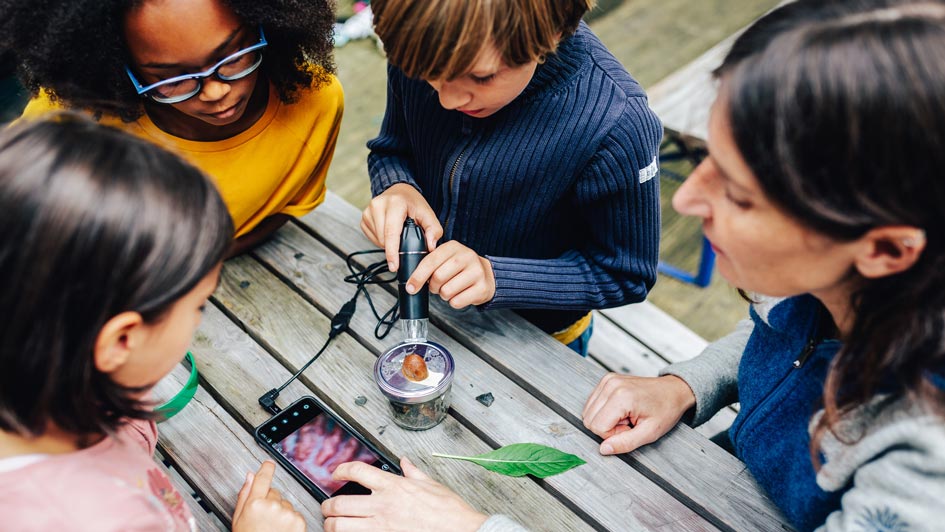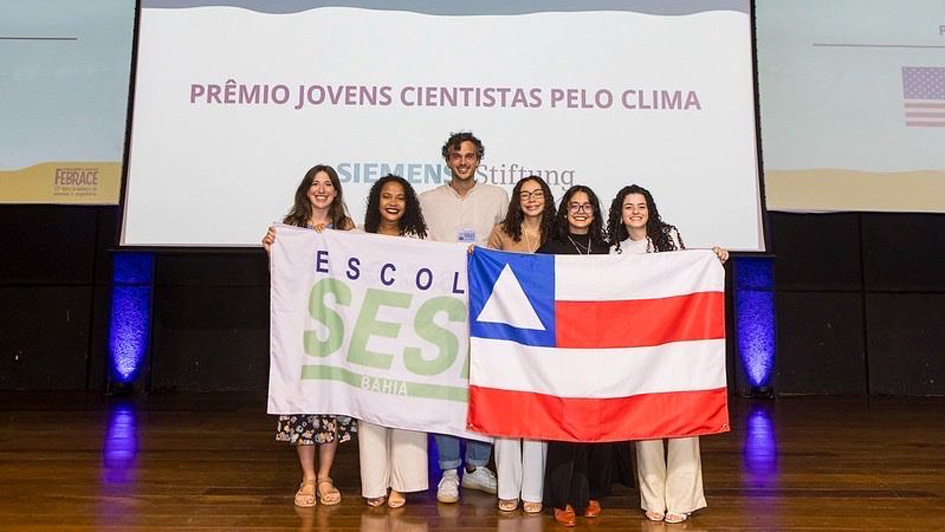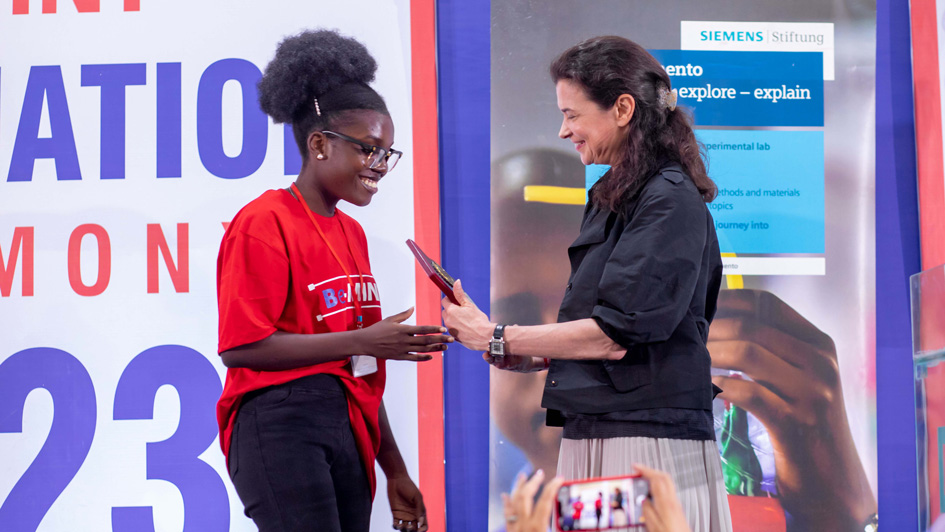“No Demon, no saviour”: International white paper dispels myths about digital media

Global network of STEM Education initiatives calls for sensible use of digital tools
© Christoph Wehrer/©Stiftung Kinder forschen
The white paper ‘Early STEM Education in the Digital Age’ shows how digital tools can improve STEM education for young learners (i.e. science, technology, engineering/computer science, and mathematics). It presents research findings and best practices from six of the world’s leading STEM Education organisations (the ‘IDoS peers’) and provides clear recommendations for weighing up the benefits and risks of using technology in early education. The International Dialogue on STEM Education (IDoS) is an international network dedicated to promoting early STEM Education worldwide.
“Are technologies good tools for learning?”, “Why are we seduced by the screens?” Questions like these dominate the debate on digital media in early STEM Education. Conflicting theories, myths, and polarised opinions make it increasingly difficult for educators and decision-makers to choose how, or if, to integrate these technologies in pre-school learning or the classroom.
The white paper offers six recommendations to advance early STEM Education with digital tools. The authors suggest a “pedagogy first” approach, whereby the teaching methods and learning objectives drive the use of the tool, not the other way around. Each recommendation is backed by practical examples from the network members.
We aimed to dispel the myths that present digital tools as either the ‘demon’ or the ‘saviour’ of education,” says Dr Elena Pasquinelli, Head of the Research & Evaluation sector at the French Fondation La main à la pâte and the leading author of the paper. “The truth is, digital tools are neither – as our research in this field shows. Their effectiveness depends entirely on how they are used by pedagogues.”
«Are technologies making us dumber?»
Six recommendations to advance early STEM Education with digital tools:
- Integrate technology with purpose: Justify digital tools based on clear learning objectives in STEM Education.
- Prioritise pedagogy: Effective teaching methods must drive technology use in STEM – not vice versa.
- Enhance, don’t replace: Use digital tools to complement real-world STEM learning.
- Prepare for success: Invest in teacher training and infrastructure for effective digital integration that benefits all.
- Empower digital literacy: Transform STEM Education to navigate a rapidly changing world.
- Use evidence-based practices: Leverage research to enhance STEM Education and effective teacher training.
The IDoS peers provide practical guidance for policymakers and other educational stakeholders by showcasing examples of high-quality technology use in daycare centres, classrooms, and teacher training. In their paper, they also outline how they have integrated digitalisation within their own organisations and expanded their STEM Education programmes through digital advancements.
«A resource for policymakers and educators in Germany and worldwide»
Dr Barbara Filtzinger, Head of Education at Siemens Stiftung says: “Our experience in Europe, Africa, Latin America, and now in India shows that digital technologies are deeply embedded in cultural practices and create new possibilities for collaborative learning and knowledge exchange. We engage with communities, teachers, and parents to co-create Open Education Resources that are free and can be easily adapted to meet the needs and contexts of students around the world. In the paper, we share best practices on how extensive teacher training and providing access to digital learning materials are preparing our next generation to thrive in a future characterised by digitalisation”.
Dr Tobias Ernst, Chairman of Stiftung Kinder forschen (Little Scientists Foundation) emphasises: “There is a long and wide-ranging debate in Germany about how digitalisation in schools can be financed and implemented. In terms of research, the white paper provides an urgently needed basis for making well-founded decisions about what makes sense and what doesn’t – not only in school settings, but also for inquiry-based learning in daycare centres, where age-appropriate digital education can be very enriching. The practical examples can incentivise educators to improve early education in the long term with the help of digital tools.”
“No Demon, no saviour”: New IDoS white paper dispels myths about digital media
For downloading the full version of the paper in different languages
About the International Dialogue on STEM Education (IDoS)
The International Dialogue on STEM Education (IDoS) is led by six organisations worldwide, whose members – the “IDoS peers” – are experts in the field of early STEM Education. As such, they each learn from one another through regular exchange to implement their work at home more efficiently, more effectively, and in a more knowledge-based way. The “International Dialogue on STEM Education” (IDoS) is a joint initiative of Stiftung Kinder forschen (Little Scientists Foundation) and Siemens Stiftung. IDoS is funded by Siemens Stiftung and the Wilhelm und Else Heraeus Foundation. IDoS is under the patronage of the OECD.
About Stiftung Kinder forschen
The non-profit Stiftung Kinder forschen (Little Scientists Foundation) is Germany’s largest early childhood education initiative in the domains of science, technology, engineering/computer science, and mathematics (STEM). With an accompanying focus on Education for Sustainable Development (ESD), the aim of the programme is to strengthen children for the future, provide them with important skills, and enable them to act in a sustainable way. Together with its local network partners, the Foundation provides a nationwide continuing professional development programme that supports pedagogical staff at early childhood education and care centres, after-school centres, and primary schools in facilitating the exploration, inquiry, and learning of children between the ages of three and ten. The partners of the Stiftung Kinder forschen are Siemens Stiftung, the Dietmar Hopp Stiftung, and the Dieter Schwarz Foundation. It receives funding from the German Federal Ministry of Education and Research (BMBF).
The educational initiative (Little Scientists Foundation)
Press contact
Communications / Head of Media Relations
Jagori Dhar
You might also be interested in
Further information

FEBRACE 2025: Students take center stage with their innovative projects to combat climate change
- At the FEBRACE fair, the Siemens Stiftung honoured a student project aimed at combating climate change. The focus was on practical STEM learning, local solutions and promoting young talent as part of the STEM+ Territórios education project.

New makerspace inaugurated in Lagos to enhance career prospects for Nigerian youth
- A makerspace, part of the BeMINT_Nigeria training and internship program for high-school graduates was launched in Lagos. 400 participants from underserved communities receive entrepreneurial and digital skills training at the innovative space.


